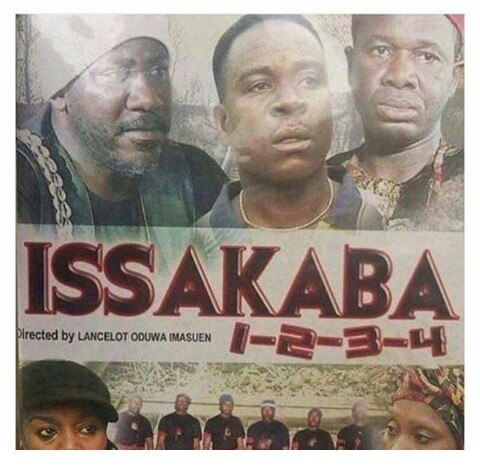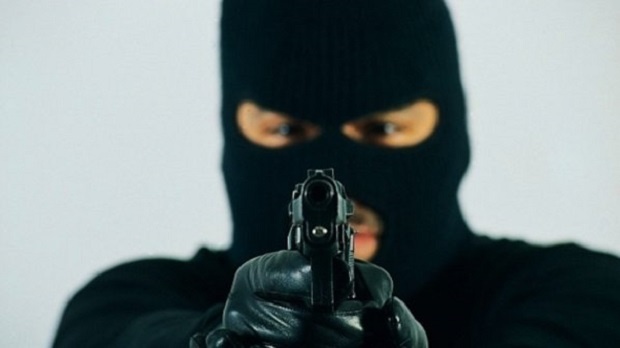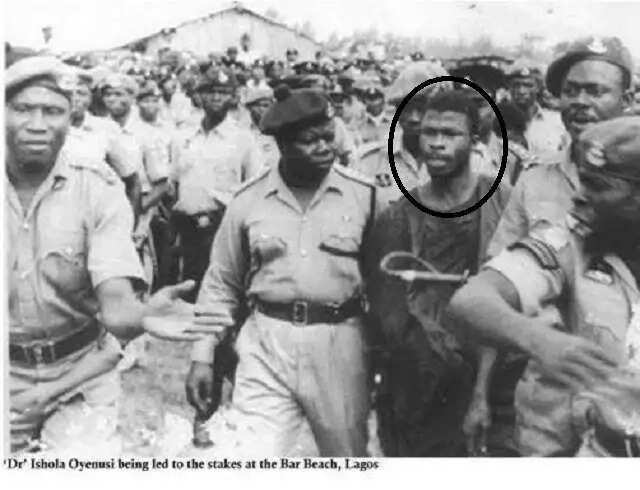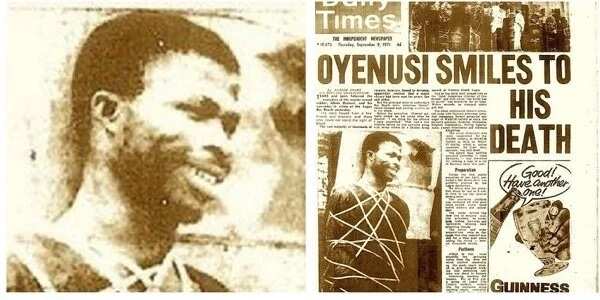Ever of, there has been a background marked by wrongdoing and offenders who have moved toward becoming people’s heroes and legends in themselves. Some of them have had their names settled in the historical backdrop of the nation as criminals who nearly crippled the country yet the manner in which you take a gander at them, they deserve the rollcall of legends and scalawags are made.
Here are the most notorious criminals Nigerians can never forget.
1. Isiaka Busari A.k.a Mighty Joe
Mighty Joe was the deputy of Ishola Oyenusi who rose to notoriety after the execution of his boss. He was even more ruthless than Oyenusi and always boasted he’d never be caught. He was caught after robbing a hotel attendant of N10. He was executed in 1973 after he converted to Islam in prison.

The famous Mighty Joe was forced to quit school after completing standard four due to his father’s inability to pay for his education. With nothing else to do, Mighty Joe developed a keen interest in boxing and would sneak out of his house to box against his parents’ will.
He left his mother’s house to fend for himself shortly after the death of his father. With the need to make money, Mighty Joe left the boxing space and went into the buying and selling market often getting many of his goods from the port. It was there that Mighty Joe started learning how to steal and outwit traders after joining a gang under Abiodun Egunjobir.
Several accounts indicate that Mighty Joe was especially feared by women. In one account, it is said that he harassed a young lady and poked her eye with a lit cigarette he had in his mouth leaving the poor lady blind.
By the 1970s, Mighty Joe had become the most wanted robber in the whole of Lagos. He had also made a name as being more deadly than
Abiodun Egunjobi and had managed to get a gang made up of ex-soldiers who gave him physical protection with the backing of spiritual powers he sought from popular juju men.

Mighty Joe Praying
On June 6, 1973, Mighty Joe was escorted with several police officers with him to the Bar Beach where he was executed in front of millions of people present.
According to a report in the Daily Times newspaper of June 7, 1973;
“It was the end of a savage legend yesterday. ‘Mighty Joe’, the kingpin of the underworld was silenced by the bullets of the firing squad”
“Thousands of Lagos people breathed a sigh of relief following the execution at Bar Beach”
“The man, Isiaka Busari, alias ‘Mighty Joe,’ for many years constituted himself a big terror to the people of this federal capital particularly those around Mushin where he lived and practised his trade”.
“It was not until November 30, 1971 that nemesis caught up with him”.
“And the offence for which he died by the firing squad at the Lagos Bar Beach yesterday was for snatching a mere N10 from a hotel bar attendant, Mr. Michael Osayunana”.
“This offence, which compared with many other heinous crimes which he committed and got away, will fade into insignificance”.
“But before he died yesterday, ‘Mighty Joe’ had a VIP ride from Kirikiri Prison to the Bar Beach. He was taken in a police van escorted by six lorryloads of tough-looking anti-riot policemen”.
Before he was executed, Mighty Joe was asked to say his lasts word to which he is reported to have responded:
“May God bless everybody, both my friends and enemies. Tell my wife, my mother and my in-law to keep fit.”
2. Shina Rambo
Shina Rambo is a former bandit who terrorised SouthWest Nigeria in the 1990s. He was born in Abeokuta, Ogun State. He was fetish and believed in rituals and human sacrifices. He later became a pastor after he was realesed from prison during Olusegun Obasanjo’s regime and afterwards, he preached the gospel.

Once upon a time, the mention of the name Shina Rambo sent shivers down the spines of many Nigerians. Rambo was a notorious armed robber who terrorized people, that even police officers were afraid of him. He was said to have murdered, robbed and left behind a history of terror that will take years to erase.
Shina Rambo is a former bandit who terrorized South-West Nigeria in the 1990s.After serving jail-time for his crimes, he was converted by an evangelist and became a Christian evangelical pastor. Shina Rambo now Mathew Oluwanifemi was a name that sent shivers down the spine of people who lived in the South West of Nigeria and even outside Nigeria, like Benin Republic and neighborhood, in the 1990s.
He was a hardened criminal, a terror and killer, one whom men of the security agencies will never forget in a haste.

A man mountain, towering about 6 ft 5inch, well built, dark-skinned and sweltering eyes, he carried out his operations, like a movie, in the broad daylight, with sophisticated weapons, and bullet belts and explosives strapped roundabout him. He specialized in robbing exotic cars on highways and robbing banks. Nothing could stop him, not even security operatives, he was totally invincible. He was Shina Rambo!
He was born in the year 1958 to a military man who was a bad egg in the service. His father was from Abeokuta in Ogun state, but his mother was a native of Sabongida–Ora in Edo state. His father had over 18 wives, as was the norm for soldiers to impregnate virtually every woman they met where they were posted to. His father used his military influence to rob innocent citizens, and always brought a huge amount of money home. This used to entice little Shina.
He recalls,
“I remembered when I was about 7 years old, my father came home with a lot of money, foreign currencies, with blood on it, and they were using something like a woman’s scarf to wipe it, then I asked him, is this an animal’s blood, or human blood?
“But he wouldn’t answer me, they were just drinking, smoking, and merrymaking.”
3. Monday Osunbor
Monday Osunbor was a Nigerian armed robber and lieutenant of Lawrence Anini who terrorised Bendel State which comprised Edo State, Delta state and its environs in the ’80s. He was executed in 1987. I still can’t 4get when he and Monday Osunbor shared the last cigarette shortly before they were tied to the stake!
4. Kayode Williams

BISHOP Kayode Williams is the Director-General of Prison Rehabilitation Mission International (PREMI). He is also the Presiding Bishop of Christ Vessel of Grace Church. Going by the names of his ministries, you would sense that he has had an exploit of the prisons. Yes, Williams once did time in prison; not a short time, but as long as 10 years!
Another startling fact: He went in for armed robbery (as a member of the dreaded Idowu Oyenusi gang) that landed him in trouble at a tender age when he was supposed to be in secondary school.
4. Okwudili Ndiwe

Okwudili Ndiwe, a 22-year old, also known by the name, “DericoNwamama” or simply, “Derico“, had risen from a random street urchin to become the leader of a ruthless armed robbery gang that was synonymous with blood and loss in the eyes of the people.
At the height of his notoriety, traders could hardly display their wares with any illusion of permanence for fear that the cries of “Derico” would rent the air and begin another chapter where some would lose their livelihoods and others, their lives.
It was no different at night; many would say they could only sleep with one eye open because Derico would come when he would, night or day.

Themetrolawyer
Whether out of the desire to make big scores or just a sheer absence of fear, Derico would rob the biggest and most secure banks, carting away millions of Naira and leaving bodies as his token.
He and his gang would lay in ambush, waiting for luxurious inter-state buses to rob. In December 2000, it is said that Derico attacked a 59-seater bus at the popular Upper Iweka. After robbing the passengers, they decided to kill all the passengers. Only four would survive.
After operations, he would often boast of his invincibility, that no man could kill him. At the height of his reign, it was estimated that Derico killed over 100 people, including police officers.
Derico’s main stomping ground was the markets of Onitsha, but he would also take his bloodthirst from Nnewi to Nkpor, to the villages of Umuleri and towns in Ihiala.
No one was safe. Not even the governor, for the uproar of the people and the physical testaments to his atrocities, made it clear that this was a matter to be troubled by.
The people’s fear of Derico made room for rumours about his person and his methods. Urban legends quickly sprung up; some claimed that he was no human and could not be gunned down by a bullet.
What was known was that Derico did not live where he worked. The media suggested at the time, that he resided in the country’s capital, in far away Abuja, an entire 450 kilometres from Anambra.
Derico only showed up when he wished to ‘operate’. After launching terror, it was onwards to Abuja.
It was said that, for a while, he maintained a hideout in the town of Umuleri as well as in neighbouring Agbor in Delta State. It was while here that he would send threatening messages to the police for killing his affiliates and members of his gang.
Ironically, it was when he killed one of his most infamous affiliates that the pendulum began to swing away from him. On the 3rd of July 2001, the vigilante group heard that Derico was on his way from his hideout in Agbor to Onitsha.
The boys lay in waiting at the end of the Niger Bridge for his commute. Soon enough, at the Bridge Head, Derico was identified in a commuter bus and subsequently arrested.
The Nigerian Police requested that he be released for investigation and prosecution but with no trust and assurance that he would meet what he deserved, the Bakassi Boys refused.
Six days after Derico was captured, the Bakassi Boys drove, singing and chanting defiantly, from their base to the popular Ochanja Market Junction.
As shouts of approval and celebration tore through the air, the Bakassi Boys leapt out of their vehicles and unveiled their prize catch; Derico. Few had seen the robber or even knew what he looked like, but what they saw, a body cut deep by machetes and beaten into a sad pulp, was not what they expected.
The Bakassi Boys had built a fearsome reputation for savagery with their treatment of captured armed robbers and suspects. Many expected Derico would meet a similar fate before them was evidence that they were on the money.
“My name is Oddy, alias Derico”.
After a crowd had gathered, one of the senior commanders of the Bakassi Boys addressed them about the group’s intentions. He spoke about how they were not in the state for politics but to restore law and order. Then he handed the microphone to Derico.
The once-feared robber was feeble under the weight of pain. Once defiant, he was noticeably weak in body and spirit. In that place of desperation where pride seems to exist no more, he made a final attempt to protest his innocence.
There are no certain accounts of what he said but something along these lines has been quoted not once or twice.
“My name is Oddy, alias Derico, alias Nwa Mama. I appeal to you, the good people of Anambra State, please don’t kill me, I don’t like evil. It was when I killed Chiejina (another suspected robber) that people thought I’m a strong guy”.

After shouts of derision filled the air, it is said that Derico, perhaps sensing the end was nigh, began to out his sponsors and protectors.
He claimed that he had been protected by a member of the National Assembly while on the run. He also fingered a member of the State’s House of Assembly and a Local Government chairman as his sponsors in the state. With the din of the crowd growing stronger, the Bakassi Boys did what they had come for.
As quickly as the first shouts had filled the atmosphere, a machete landed on Derico’s neck. His severed head rolled onto the ground as blood trooped in spurts from his arteries.

A visibly excited crowd shouted its approval and soon descended into songs in praise of the Bakassi Boys. It is said that Derico’s body was chopped up and set on fire.
Gistmania
This chase and capture of Derico inspired Lancelot Imasuen’s 2001 movie, Issakaba described as Nigeria’s greatest action film.

3. Abiodun Egunjobi
Abiodun Egunjobi, alias Godogodo, was the modern day version of Lawrence Anini. The one-eyed monster was one of the deadliest armed robbers Nigeria ever had.
The 36-years-old Godogodo rose from being a slum boy to the leader of a gang that defied all reasons, struck with precision, killed without mercy and terrorized Lagos and the south-west with reckless abandon.
Before his arrest on August 1, 2013, Godogodo gave the Lagos State Police Command so much headache for 14 years, so much so that on the day he was arrested, the command erupted in joy: at least its men would be safe from his guns.
Originally from Ogun State, Egunjobi was on the wanted list of the police for over 10 years and the way he managed to evade the police is still legendary.
In fact, he was at a time, on the top of the Most Wanted list of the Command with several Police Commissioners assigning the toughest of cops on his trail.
At that time, any robbery in Lagos had the imprint of Godogodo, with him leading or one of his boys being responsible. He was famed for leading many robbery operations, especially on banks, with the infamous reputation of killing over 100 policemen in Lagos State.
Godogodo allegedly went for operations with a bag containing 10 fully loaded AK 47 rifles with 30 rounds of ammunition each and as such, he was fully prepared in terms of weapons on his back.
It was gathered that Godogodo used to tell his gang members that he would never be arrested alive and had vowed to go down with as many policemen as possible on the day he is unable to escape arrest.
This vow was later found to be real, as anti-robbery detectives recovered several loaded AK47s, each with 60 rounds of live ammunition, from different parts of his residence, including the kitchen, bedroom, bathroom, sitting room on the day of his arrest.
He was so good at disguising his criminal activities that even his wife and family members never knew what he was into. He had six houses in different locations including Lagos, Ogun and Ondo States, and never stayed in a particular location for more than a month.
Godogodo began his voyage into the deadly world of crime after spending seven years in prison for what he considered a minor offence.

As a scrap dealer in the slum of Gatankowa, Abule-Egba, he was involved in a fight and the police arrested him. With no one to bail him out, Godogodo was sent to jail and in his mind, he believed his going to prison was an injustice and blamed the police for it.
While in prison, he became acquainted with more deadly armed robbers and formed an alliance with them and took the time to understudy them. When he finally left prison, he decided that he was going to deal with the police for sending him to prison for seven years.
During his interrogation, Godogodo told the police that he took only raw cash during his operations and would only attack a place he knew there would be enough cash to cart away. He also said he doesn’t have any bank account as he invested all his money in the property immediately after each operation.
Abbey Godogodo visited many Lagosians with sorrow, tears, and blood. Many would not forget Sunday, September 9, 2012, when he and his gang terrorized the state and left indelible marks in the minds of many families after he led a coordinated attack in the city where many innocent people including policemen lost their lives.
He revealed how he coordinated the bloody operation and gave chilling details of how he led members of his gang to cart away millions of Dollars from bureau de change operators in Agege and Gbagada areas of Lagos.
The Lagos State Police Command led by the then Commissioner, Umar Manko, mandated the Special Anti-Robbery Squad (SARS), led by Superintendent of Police, Abba Kyari, to bring an end to the reign of Abbey Godogodo and that began intensive investigations which led to the capitulation of his empire.
Manko was given direct orders by the then Inspector General of Police to make sure the Godogodo phenomenon was quashed at all cost.
After the gang attacked the Murtala Mohammed International Airport, where two police inspectors and more than five people were killed and over N100 million stolen, the police decided to focus on profiling the suspect, because, up to that point, no one knew anything about him or what he looked like. The police also began looking at the possibility of preempting his subsequent operations.
2. Doctor Ishola Oyenusi

Ishola Oyenusi popularly known as Dr. Ishola was a Nigerian notorious armed robber in his time who was active during the 1970s. His modus operandi was carjackings, bank robberies and heists committed during hold-ups.
Oyenusi together with six other members of his gang were executed on 8 September 1971 by a combined police and armed forces firing brigade. His execution was caught on film.

OldNaija confirmed that doctor Oyenusi, as he was called, was not a doctor by profession but adopted the title for the fun of it. The evidence lies in a confession he made a few minutes before his execution. He confessed that his parents were not capable of furthering his secondary school education and that was what forced him into robbery. So without having a secondary school education, Oyenusi by no way could have been a medical doctor.

Oyenusi started off his robbery career by snatching a car (whose owner died in the process) just because his (Oyenusi) girlfriend needed some money. It was claimed by some sources that Oyenusi was romantic.
He sold the car at the price of N400 and gave the money to his girlfriend. It was also said that Oyenusi was hot-tempered and quiet arrogant. During his arrest, he thundered down on a police officer who was ushering him around. He said, “people like you don’t talk to me like that when I’m armed, I gun them down!”
Doctor Ishola Oyenusi came into limelight after the Nigerian civil war ended in 1970. He robbed banks and people in both daylight and night, and he never let any of his victims live to see another day; he killed them all! This earned him the name “Doctor rob and kill“.
At the height of his horrific reign, Ishola Oyenusi bragged that “the bullet has no power“. He probably forgot that he who live by the sword will surely die by the sword. Oyenusi was so infamous that he was regarded by some people as the “first celebrated armed robber in Nigeria“, and after him was Lawrence Anini, Babatunde Folorunsho (Baba oni lace), Shina Rambo, Buraimo Jimoh and others.
Ishola Oyenusi’s Arrest
However, nothing lasts forever, and as the Yoruba adage says, everyday belongs to the thief while a day belongs to the owner.
On the 27th of March, 1971, Oyenusi was nabbed by the police during one of his robbery operations in which he and his notorious gang killed a police constable named Mr. Nwi and stole $28,000 as at then. Cloud of shame hovered above Doctor Ishola Oyenusi as he was cast before the law and found guilty then sentenced to death by firing squad.
Oyenusi confessed that he was not to die alone because he did not commit the crimes alone. He vomited the names of other members of the gang which was as follows: Joseph Osamedike, Ambrose Nwokobia, Joel Amamieye, Philip Ogbolumain, Ademola Adegbitan, and Stephen Ndubuokwu.
Back then, public execution was the order of the day, so when Oyenusi was ushered to the popular Bar Beach in Lagos where he was to be executed, over 30,000 Nigerians were happily and excitedly waiting to see the man who had terrorized them get riddled by hot bullets. It was said that some civil servants even brought a coffin to the execution ground to mock the once mighty robber kingpin who was now nothing but a scapegoat whose breath would be exhausted at any moment.

Ishola Oyenusi being led to the stake
Ishola Oyenusi’s execution
Trucks carrying Oyenusi and his executors arrived at the execution ground around 10:am. Doctor Oyenusi, his gang members and one other criminal got down slowly.
People jeered and booed them, especially Oyenusi who they had really trooped out to watch die. Oyenusi donned a dark long-sleeve shirt and had his hands tied behind him.
He was sweating profusely but managed to smile all the way to the stakes. He kept smiling, smiling and smiling but could still not hide the agony and terror written boldly on his face.
Few minutes before he was shot, Oyenusi told journalists that he would not have ventured into armed robbery if his parents were capable of sending him to secondary school.
He also said;
“I am dying for the offense I have committed“.
Oyenusi and other criminals were fastened to the stakes. The soldiers lined in front of them and aimed their ever-ready guns. Some of the criminals yelled their last words of protest at the cameras. Then a loud voice let out the word “fire“! Oyenusi and other criminals’ bodies were sprayed with bullets.
That was the bitter end of Ishola Oyenusi who lived by the bullets and died by the bullets. The execution of Doctor Ishola Oyenusi sent the streets of Lagos deserted at night. Families locked themselves behind doors for the fear that some of Oyenusi’s boys might retaliate.

Doctor Ishola Oyenusi (circled) and his gang’s execution
This fear lasted long that even in 1977, the veteran movie director, Eddie Ugbomah, called for actors to play the role of Oyenusi in a movie he was about to produce titled “The Rise and Fall of Dr. Oyenusi“, but no actor was brave enough to step forward to play the role.
They all feared that Oyenusi’s boys might show them pepper. Eddie Ugbomah had no choice than to play the role of Oyenusi himself. In the movie, he revealed the secrets of top Nigerian officials and military men backing Oyenusi and his gang by providing them money and weapons.
As expected, Eddie Ugbomah was threatened and later, his store was looted. He was told in a letter to stop shooting the movie and everything would be returned to him. But Eddie Ugbomah proved not to be a coward by eventually releasing the movie in 1977.
In recent times, a Nollywood actor, Odunlade Adekola, also released a movie (Oyenusi) detailing the life of Ishola Oyenusi, the most notorious Nigerian armed robber.
The name Ishola Oyenusi will forever be remembered in the history of crime in Nigeria.
1. Lawrence Anini
The gangster that seized a Nigerian state
Small things matter, but little attention is always paid to small matter. When Kingsley Eweka, a prince of Benin was about to be shot for armed robbery in mid 1986, he craned his neck on the stake to tell those asking If he had anything to say:
“My friend and his boys will avenge my death!”
A smile slipped out the cheeks of the questioners: no one knew his friend, and no one wanted to know. It was a matter for laughter, and since they could not laugh, they sneered. But soon, everyone knew Kingsley’s friend in Bendel State of Nigeria.
Yes, Bendel State. There was once a state in Nigeria called Bendel. It was the old Benin and Delta provinces of Western region that was merged on 8 August 1963 to become Midwestern State, and was changed to Bendel State on 17 March 1976, That was its name until 27 August 1991 when it was divided into two: one part named Edo, and the other now called Delta. But in 1986, it was Bendel, and this was where Kingsley’s friend took his revenge.
The friend was a young man called Lawerence Anini. He was born in 1960 to the family of Owuo quarters in Orogbo village, Orhionmwon area of the state.
He was brought to Benin as a toddler where he attended Oza Primary School, and was a known truant while in the School. All the same, he completed the school and got admission to Igiedumu Secondary School.

He was there for three years before he abandoned it in about 1976 and started learning how to repair motor vehicles. But he spent only three months in the mechanic workshop.
What happened was that one day, he was caught in the act when he stole N7 belonging to one of his mates in the garage. When he was seen with the money, he said the money was given to him by his mother to buy drugs for her, but when David Isiokherhe, the master of the shop, threatened that “Juju” would be brought to get the money, he confessed that he indeed stole the money. Immediate search revealed that he had spent N2 out of the money, in less than an hour. He was summarily dismissed.

When he would be seen later, he had become a lorry driver, even when he was not 18 years old, but very popular, though, because of his expertise on the steering.
He was doing this until politics started in 1979 and he became a full-time party thug, reaping bountifully from hooliganism. It was while in this new profession he learnt the use of firearms and quickly became the leader of many of the boys. They gave him another name “Ovbigbo the law”.
So it became easy to switch to armed robbery when politics was banned in early n1984. The business was booming, and he was notorious for reckless spending. Here he met Kingsley, and they became a partner in crime. They were both friendly with the police too, and that was why he could not allow his friend to die in vain. Sometime in July 1986, he started the war with the Police, and by August, the Police too began a counter attack.
Two months later, the Police offensive in Benin City against the prevailing mafia –style armed robbery ran, on the night of October 1 to a sudden, explosive climax of gunfire and blood. At about 9 pm and about a hundred meters away from a police roadblock along Ring Road in the heart of the ancient city, rapid gunshots obviously from superior weaponry broke the eerie calmness of the night.
Just like a textbook replay of any of the deadly efficient attacks of Italy Red Brigade, the notorious terrorist guerrilla group of the late 70s and like the Red Brigade’s victims, who were invariably the cream of the Italian society, the victims of the Benin shoot-out included Commissioner of Police. Yes, the Police Chief was shot!
He paid dearly for the attack as his bullet-ridden private car, a new Peugeot 504 station wagon, wobbled to a halt, a bullet tore though the ridge of his nose. Even so, Akagbosu was two times lucky.
Police sources said that the first volley of shot jolted him into a reflex action; he jerked his face sideways from its previous straight forward position to ascertain the direction of the attack. This unconscious act was all the insurance he needed against a fatal tragedy because his head, then turned at a sharp angle, was inches off the course of the bullet aimed at it.
Source: Nairaland/Pulse ng
What do you think about this? Please share your thoughts with us below





























No comments:
Post a Comment